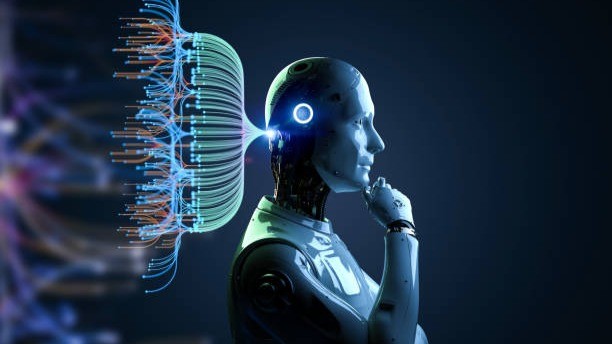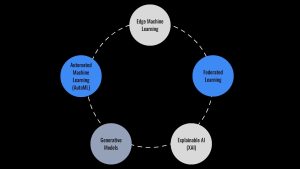Innovations in Machine Learning: What Businesses Need to Know
Introduction Machine Learning (ML) is no longer a futuristic concept. It’s a driving force behind business transformation across industries – from retail and healthcare to man...

Introduction
Machine Learning (ML) is no longer a futuristic concept. It’s a driving force behind business transformation across industries – from retail and healthcare to manufacturing and finance. As ML technology evolves, it brings new opportunities for automation, insights, and personalization. Yet, understanding these innovations and their potential impact is key to staying competitive.
Let’s explore the latest innovations in machine learning and what they mean for businesses ready to innovate.
Evolution of Machine Learning
Machine learning has come a long way from simple predictive models. Today, it relies on advanced algorithms, vast datasets, and computing capabilities that would have been unimaginable a decade ago. Modern machine learning doesn’t simply analyze data – it learns patterns, predicts outcomes, and optimizes operations in real time.
Recent innovations focus on efficiency, adaptability, and ethical use. Companies are now adopting machine learning solutions that require less labeled data, provide faster learning, and enable transparent decision making. These advances make the technology more accessible and practical for organizations of all sizes.

Key Innovations Shaping Machine Learning Today
1. Automated Machine Learning (AutoML)
AutoML tools simplify the process of building and deploying machine learning models. They automate tasks such as feature selection, model tuning, and validation, making machine learning accessible to non-experts.
For businesses, this means faster time to value and reduced dependence on specialized specialists, allowing teams to focus on strategy and innovation rather than model complexity.
2. Edge Machine Learning
Edge machine learning brings computing closer to where data is generated – to devices such as sensors, drones, or smartphones.
This innovation enables real-time analytics, reduces latency, and improves data privacy. It is particularly valuable for industries such as manufacturing, logistics, and healthcare, where instant analytics can prevent downtime or improve security.
3. Federated Learning
Federated learning allows multiple systems to collaboratively train models without sharing source data. Instead, models are trained locally and aggregated centrally. This approach improves data security and compliance, making it ideal for sectors with strict privacy regulations, such as finance and healthcare.
4. Explainable AI (XAI)
Transparency in AI decision-making is becoming a business imperative. Explainable AI helps users understand why a model made a certain prediction.
This builds trust, promotes the ethical use of AI, and simplifies regulatory compliance, especially as AI becomes increasingly integrated into customer engagement and risk management.
5. Generative Models
From content creation to product design, generative models such as generative networks and diffusion models are transforming business creativity.
They can generate realistic images, simulations, and even predictive scenarios, helping organizations accelerate innovation cycles and improve user experiences.

How These Innovations Impact Businesses
The new wave of innovation in machine learning (ML) offers tangible business benefits. Companies integrating modern machine learning tools gain a competitive advantage through:
- Improved decision-making: Real-time analytics enables more informed, data-driven strategies.
- Cost reduction: Automation optimizes workflows and reduces human error.
- Improved customer engagement: Machine learning-based personalization maintains customer loyalty and satisfaction.
- Operational efficiency: Predictive maintenance and process optimization minimize waste and downtime.
However, success depends on more than just technology – it requires data readiness, skilled professionals, and strategic alignment.
Challenges to Consider
Machine learning innovations open up new opportunities but also create new challenges:
- Data quality and availability: The quality of machine learning models is directly dependent on the quality of the data they are trained on.
- Ethical issues: Companies must ensure the fairness and objectivity of their algorithms.
- Integration challenges: Implementing machine learning into legacy systems can be challenging without expert guidance.
- Talent shortages: Qualified machine learning engineers and data scientists remain in demand.
Collaborating with experienced software vendors can help overcome these barriers and accelerate adoption.
Preparing for the Future of Machine Learning
Machine learning will continue to evolve, with innovations such as self-supervised learning, quantum machine learning, and adaptive AI already on the horizon. Companies that invest early in scalable and transparent machine learning frameworks will have a better opportunity for long-term success.
To prepare, organizations should:
- Adopt a data-centric approach – create reliable, clean, and secure data pipelines.
- Integrate AI responsibly, prioritizing fairness, transparency, and accountability.
- Collaborate strategically – work with partners who can turn machine learning innovations into measurable value.

Conclusion
Machine learning is transforming industries and reshaping business strategies. Thanks to innovations like AutoML, federated learning, and XAI, it’s becoming more accessible, ethical, and effective than ever before.
For businesses, adopting machine learning innovations isn’t just about implementing technology; it’s about creating more intelligent systems, improving user experiences, and strengthening competitive advantages.
The question is no longer whether to implement machine learning, but how effectively you can use it to transform your business.